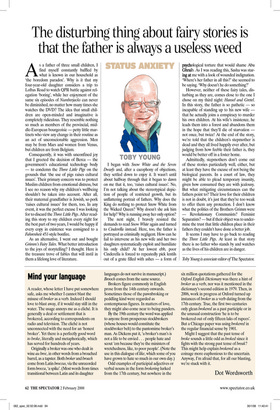The disturbing thing about fairy stories is that the father is always a useless weed
As a father of three small children, I find myself constantly baffled by what is known in our household as ‘the boredom paradox’. Why is it that my four-year-old daughter considers a trip to Loftus Road to watch QPR battle against relegation ‘boring’, while her enjoyment of the same six episodes of Numberjacks can never be diminished, no matter how many times she watches the DVD? The idea that small children are open-minded and imaginative is completely ridiculous. They resemble nothing so much as members of the provincial, middle-European bourgeoisie — petty little martinets who view any change in their routine as an act of unconscionable aggression. Men may be from Mars and women from Venus, but children are from Belgium.
Consequently, it was with unconfined joy that I greeted the decision of Berca — the government’s educational technology body — to condemn the Three Little Pigs on the grounds that ‘the use of pigs raises cultural issues’. Their primary concern was to protect Muslim children from emotional distress, but I see no reason why my children’s wellbeing shouldn’t be taken into account. After all, their maternal grandfather is Jewish, so pork ‘raises cultural issues’ for them, too. In any event, it was the perfect excuse I was looking for to discard the Three Little Pigs. After reading this story to my children every night for the best part of two years, I would be happy if every copy in existence was consigned to a Fahrenheit 451-style bonfire.
As an alternative, I went out and bought Grimm’s Fairy Tales. What better introduction to the joys of storytelling? I thought. Here is the treasure trove of fables that will instil in them a lifelong love of literature. I began with Snow White and the Seven Dwarfs and, after a cacophony of objections, they settled down to enjoy it. It wasn’t until about halfway through that it began to dawn on me that it, too, ‘raises cultural issues’. No, I’m not talking about the stereotypical depiction of people of restricted growth, but its unflattering portrait of fathers. Why does the King do nothing to protect Snow White from the Wicked Queen? Why doesn’t she ask him for help? Why is running away her only option?
The next night, I bravely resisted the demands to read Snow White again and turned to Cinderella instead. Here, too, the father is portrayed as criminally negligent. How can he fail to intervene as his new wife and her two daughters systematically exploit and humiliate his only child? At her lowest ebb, poor Cinderella is forced to repeatedly pick lentils out of a grate filled with ashes — a form of ological torture that would shame Abu b. As I was reading this, Sasha was star
me with a look of wounded indignation. ‘Where’s her father in all this?’ she seemed to be saying. ‘Why doesn’t he do something?’
However, neither of these fairy tales, disturbing as they are, comes close to the one I chose on my third night: Hansel and Gretel. In this story, the father is so pathetic — so incapable of standing up to his new wife — that he actually joins a conspiracy to murder his own children. At his wife’s insistence, he leads them into a forest and abandons them in the hope that they’ll die of starvation — not once, but twice! At the end of the story, we’re told that the children’s stepmother is dead and they all lived happily ever after, but judging from how feeble their father is, they would be better off in a foster home.
Admittedly, stepmothers don’t come out of these stories particularly well, either, but at least they have the excuse of not being the biological parents. In a court of law, they might be able to plead temporary insanity, given how consumed they are with jealousy. But what mitigating circumstances can the fathers point to? Their love for their children is not in doubt, it’s just that they’re too weak to offer them any protection. I don’t know what the politics of the Brothers Grimm were — Revolutionary Communists? Feminist Separatists? — but if their object was to undermine the trust that little children place in their fathers they couldn’t have done a better job.
It seems I may have to go back to reading the Three Little Pigs. At least in that story there is no father who stands by and watches as the lives of his children are in danger.
Toby Young is associate editor of The Spectator.


































































 Previous page
Previous page